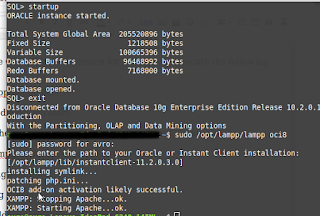Examples ¶
These examples connect as the HR user, which is the sample "Human Resources" schema supplied with the Oracle database. The account may need to be unlocked and the password reset before you can use it.
The examples connect to the XE database on your machine. Change the connect string to your database before running the examples.
Example #1 Basic query
This shows querying and displaying results. Statements in OCI8 use a prepare-execute-fetch sequence of steps.
<?php
$conn = oci_connect('hr', 'welcome', 'localhost/XE');
if (!$conn) {
$e = oci_error();
trigger_error(htmlentities($e['message'], ENT_QUOTES), E_USER_ERROR);
}
// Prepare the statement
$stid = oci_parse($conn, 'SELECT * FROM departments');
if (!$stid) {
$e = oci_error($conn);
trigger_error(htmlentities($e['message'], ENT_QUOTES), E_USER_ERROR);
}
// Perform the logic of the query
$r = oci_execute($stid);
if (!$r) {
$e = oci_error($stid);
trigger_error(htmlentities($e['message'], ENT_QUOTES), E_USER_ERROR);
}
// Fetch the results of the query
print "<table border='1'>\n";
while ($row = oci_fetch_array($stid, OCI_ASSOC+OCI_RETURN_NULLS)) {
print "<tr>\n";
foreach ($row as $item) {
print " <td>" . ($item !== null ? htmlentities($item, ENT_QUOTES) : " ") . "</td>\n";
}
print "</tr>\n";
}
print "</table>\n";
oci_free_statement($stid);
oci_close($conn);
?>
Example #2 Inserting with bind variables
Bind variables improve performance by allowing reuse of execution contexts and caches. Bind variables improve security by preventing some kinds of SQL Injection problems.
<?php
// Before running, create the table:
// CREATE TABLE MYTABLE (mid NUMBER, myd VARCHAR2(20));
$conn = oci_connect('hr', 'welcome', 'localhost/XE');
if (!$conn) {
$e = oci_error();
trigger_error(htmlentities($e['message'], ENT_QUOTES), E_USER_ERROR);
}
$stid = oci_parse($conn, 'INSERT INTO MYTABLE (mid, myd) VALUES(:myid, :mydata)');
$id = 60;
$data = 'Some data';
oci_bind_by_name($stid, ':myid', $id);
oci_bind_by_name($stid, ':mydata', $data);
$r = oci_execute($stid); // executes and commits
if ($r) {
print "One row inserted";
}
oci_free_statement($stid);
oci_close($conn);
?>
Example #3 Binding in the WHERE clause of a query
This shows a single scalar bind.
<?php
$conn = oci_connect("hr", "hrpwd", "localhost/XE");
if (!$conn) {
$m = oci_error();
trigger_error(htmlentities($m['message']), E_USER_ERROR);
}
$sql = 'SELECT last_name FROM employees WHERE department_id = :didbv ORDER BY last_name';
$stid = oci_parse($conn, $sql);
$didbv = 60;
oci_bind_by_name($stid, ':didbv', $didbv);
oci_execute($stid);
while (($row = oci_fetch_array($stid, OCI_ASSOC)) != false) {
echo $row['LAST_NAME'] ."<br>\n";
}
// Output is
// Austin
// Ernst
// Hunold
// Lorentz
// Pataballa
oci_free_statement($stid);
oci_close($conn);
?>
Example #4 Inserting and fetching a CLOB
For large data use binary long object (BLOB) or character long object (CLOB) types. This example uses CLOB.
<?php
// Before running, create the table:
// CREATE TABLE MYTABLE (mykey NUMBER, myclob CLOB);
$conn = oci_connect('hr', 'welcome', 'localhost/XE');
if (!$conn) {
$e = oci_error();
trigger_error(htmlentities($e['message'], ENT_QUOTES), E_USER_ERROR);
}
$mykey = 12343; // arbitrary key for this example;
$sql = "INSERT INTO mytable (mykey, myclob)
VALUES (:mykey, EMPTY_CLOB())
RETURNING myclob INTO :myclob";
$stid = oci_parse($conn, $sql);
$clob = oci_new_descriptor($conn, OCI_D_LOB);
oci_bind_by_name($stid, ":mykey", $mykey, 5);
oci_bind_by_name($stid, ":myclob", $clob, -1, OCI_B_CLOB);
oci_execute($stid, OCI_NO_AUTO_COMMIT); // use OCI_DEFAULT for PHP <= 5.3.1
$clob->save("A very long string");
oci_commit($conn);
// Fetching CLOB data
$query = 'SELECT myclob FROM mytable WHERE mykey = :mykey';
$stid = oci_parse ($conn, $query);
oci_bind_by_name($stid, ":mykey", $mykey, 5);
oci_execute($stid);
print '<table border="1">';
while ($row = oci_fetch_array($stid, OCI_ASSOC+OCI_RETURN_LOBS)) {
print '<tr><td>'.$row['MYCLOB'].'</td></tr>';
// In a loop, freeing the large variable before the 2nd fetch reduces PHP's peak memory usage
unset($row);
}
print '</table>';
?>
Example #5 Using a PL/SQL stored function
You must bind a variable for the return value and optionally for any PL/SQL function arguments.
<?php
/*
Before running the PHP program, create a stored function in
SQL*Plus or SQL Developer:
CREATE OR REPLACE FUNCTION myfunc(p IN NUMBER) RETURN NUMBER AS
BEGIN
RETURN p * 3;
END;
*/
$conn = oci_connect('hr', 'welcome', 'localhost/XE');
if (!$conn) {
$e = oci_error();
trigger_error(htmlentities($e['message'], ENT_QUOTES), E_USER_ERROR);
}
$p = 8;
$stid = oci_parse($conn, 'begin :r := myfunc(:p); end;');
oci_bind_by_name($stid, ':p', $p);
oci_bind_by_name($stid, ':r', $r, 40);
oci_execute($stid);
print "$r\n"; // prints 24
oci_free_statement($stid);
oci_close($conn);
?>
Example #6 Using a PL/SQL stored procedure
With stored procedures, you should bind variables for any arguments.
<?php
/*
Before running the PHP program, create a stored procedure in
SQL*Plus or SQL Developer:
CREATE OR REPLACE PROCEDURE myproc(p1 IN NUMBER, p2 OUT NUMBER) AS
BEGIN
p2 := p1 * 2;
END;
*/
$conn = oci_connect('hr', 'welcome', 'localhost/XE');
if (!$conn) {
$e = oci_error();
trigger_error(htmlentities($e['message'], ENT_QUOTES), E_USER_ERROR);
}
$p1 = 8;
$stid = oci_parse($conn, 'begin myproc(:p1, :p2); end;');
oci_bind_by_name($stid, ':p1', $p1);
oci_bind_by_name($stid, ':p2', $p2, 40);
oci_execute($stid);
print "$p2\n"; // prints 16
oci_free_statement($stid);
oci_close($conn);
?>
Example #7 Calling a PL/SQL function that returns a REF CURSOR
Each returned value from the query is a REF CURSOR that can be fetched from.
<?php
/*
Create the PL/SQL stored function as:
CREATE OR REPLACE FUNCTION myfunc(p1 IN NUMBER) RETURN SYS_REFCURSOR AS
rc SYS_REFCURSOR;
BEGIN
OPEN rc FOR SELECT city FROM locations WHERE ROWNUM < p1;
RETURN rc;
END;
*/
$conn = oci_connect('hr', 'welcome', 'localhost/XE');
$stid = oci_parse($conn, 'SELECT myfunc(5) AS mfrc FROM dual');
oci_execute($stid);
echo "<table border='1'>\n";
while (($row = oci_fetch_array($stid, OCI_ASSOC))) {
echo "<tr>\n";
$rc = $row['MFRC'];
oci_execute($rc); // returned column value from the query is a ref cursor
while (($rc_row = oci_fetch_array($rc, OCI_ASSOC))) {
echo " <td>" . $rc_row['CITY'] . "</td>\n";
}
oci_free_statement($rc);
echo "</tr>\n";
}
echo "</table>\n";
// Output is:
// Beijing
// Bern
// Bombay
// Geneva
oci_free_statement($stid);
oci_close($conn);
?>





